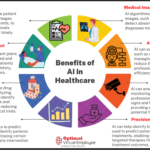Artificial Intelligence (AI) is increasingly influencing various fields within healthcare, with mental health diagnostics emerging as a particularly impactful area. The traditional methods of diagnosing mental health conditions often rely heavily on subjective assessments and patient self-reports, which can introduce variability and potential biases. AI technologies offer a transformative potential by enhancing diagnostic accuracy, facilitating early detection, personalizing treatment plans, and expanding access to care. This article delves into the benefits of AI in mental health diagnostics, highlighting how these advancements are improving patient outcomes and reshaping the landscape of mental health care.
Enhancing Diagnostic Accuracy
One of the most significant benefits of AI in mental health diagnostics is the enhancement of diagnostic accuracy. Traditional diagnostic approaches often depend on clinician expertise and patient self-reporting, which can be influenced by various factors such as personal biases, communication barriers, and variability in symptom presentation. AI systems, particularly those utilizing machine learning and natural language processing, can analyze large volumes of data from diverse sources—such as electronic health records, patient interviews, and even social media activity—to identify patterns associated with mental health conditions.
For instance, AI algorithms can process and interpret complex linguistic patterns in text data from patient communications to detect signs of depression, anxiety, or other mental health disorders. By providing a more objective analysis, AI reduces the likelihood of misdiagnosis and enhances the accuracy of mental health assessments. This increased diagnostic precision is crucial for ensuring that patients receive the appropriate treatment and support for their specific conditions.
Facilitating Early Detection and Intervention
Early detection and intervention are critical in mental health care, as they can significantly impact the course of treatment and patient outcomes. AI technologies facilitate early detection by continuously monitoring and analyzing data from various sources, such as wearable devices, mobile health apps, and electronic health records. These tools can detect subtle changes in behavior, mood, or physiological indicators that may signal the onset of a mental health condition.
For example, AI-powered applications can track changes in speech patterns, activity levels, or sleep patterns to identify early warning signs of mental health issues like depression or bipolar disorder. By enabling timely intervention, AI helps to address potential mental health problems before they escalate, allowing for more effective and proactive treatment strategies. This early intervention is crucial for improving long-term outcomes and reducing the severity of mental health conditions.
Supporting Personalized Treatment Plans
AI also plays a vital role in developing personalized treatment plans for individuals with mental health conditions. Mental health care is often most effective when treatments are tailored to the unique needs and circumstances of each patient. AI systems can analyze a patient’s comprehensive health data, including medical history, genetic information, and previous treatment responses, to recommend personalized treatment options.
For instance, AI algorithms can predict which type of therapy or medication might be most effective based on an individual’s specific characteristics and previous responses to treatment. This personalized approach enhances the likelihood of treatment success by aligning with the individual needs and preferences of each patient. By optimizing treatment plans, AI helps to improve patient adherence and outcomes, ultimately leading to more effective management of mental health conditions.
Expanding Access to Mental Health Care
The integration of AI into mental health diagnostics has the potential to expand access to care, particularly for individuals who face barriers to traditional mental health services. Geographical location, stigma, and cost are common obstacles that can limit access to mental health care. AI-driven tools, such as virtual therapists, chatbots, and mobile health applications, offer scalable solutions that can provide support and diagnostics remotely.
For example, AI-powered chatbots like Woebot and Wysa offer real-time conversational support and therapeutic interventions for individuals experiencing mental health issues. These tools can provide immediate assistance and guidance, helping to bridge gaps in care and reach individuals who might otherwise be unable to access traditional mental health services. By improving accessibility, AI ensures that more people receive the support they need, regardless of their location or circumstances.
Enhancing Monitoring and Follow-Up
AI technologies also contribute to enhanced monitoring and follow-up of patients undergoing mental health treatment. Continuous monitoring of patient progress is essential for adjusting treatment plans and ensuring that patients are responding effectively to interventions. AI-powered tools can track and analyze data related to patient behavior, mood, and treatment adherence, providing valuable insights for clinicians.
For instance, AI systems can analyze data from mobile health apps or wearable devices to monitor changes in mood, sleep patterns, or activity levels. This continuous monitoring allows healthcare providers to identify trends and make timely adjustments to treatment plans based on real-time data. By enhancing monitoring and follow-up, AI helps to ensure that patients receive ongoing support and that their treatment remains aligned with their evolving needs.
Conclusion
AI is making a profound impact on mental health diagnostics by enhancing diagnostic accuracy, facilitating early detection, supporting personalized treatment plans, and expanding access to care. These advancements are transforming the way mental health conditions are identified, treated, and managed, leading to improved patient outcomes and a more efficient mental health care system. While there are challenges and ethical considerations associated with the use of AI, the benefits it offers in mental health diagnostics are significant. By leveraging AI technologies and addressing potential limitations, the field of mental health care can continue to advance towards more effective, accessible, and personalized solutions, ultimately improving the quality of care for individuals with mental health conditions.




